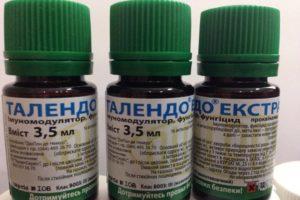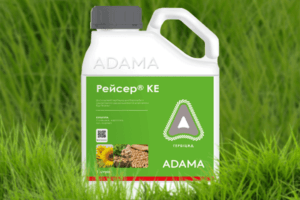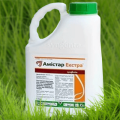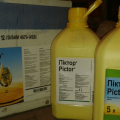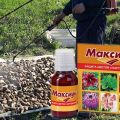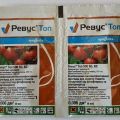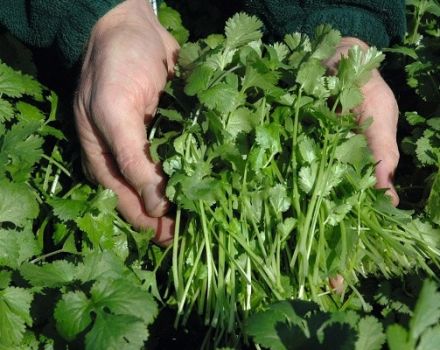Instructions for the use of the fungicide Carbendazim and the composition of the product
Carbendazim is a popular remedy for combating fungal infections that affect vegetable crops in a summer cottage. Many summer residents who use this fungicide note its effectiveness not only in the prevention of diseases, but also in the treatment of plants already affected by the fungus. Let's look at the instructions for using the fungicide Carbendazim and figure out how to use the plant protection product correctly.
Content
- 1 Composition, release form and purpose of the drug
- 2 Advantages and disadvantages
- 3 Mechanism and speed of action of Carbendazim
- 4 Protective period
- 5 Consumption rates
- 6 Preparation of working solution
- 7 Instructions for the use of the fungicide
- 8 Precautions for use
- 9 Phytotoxicity
- 10 Possibility of emergence of resistance
- 11 Is it compatible with other products?
- 12 Storage rules
- 13 Drug analogues
Composition, release form and purpose of the drug
Carbendazim is a fungicide supplied in powder form for dissolution in water. The concentration of the active substance is fifty percent. It is intended for the treatment of garden and vegetable crops against the effects of fungal infections. Destroys harmful microorganisms that carry plant diseases.
Advantages and disadvantages
One of the main advantages of the drug is that it is effective both for prophylactic effects on plants and for the treatment of plants already infected with infections. Moreover, the product is safe and not toxic to humans or pets. The tool is fully compatible with other preparations of the class of fungicides, with the exception of those that contain a large amount of alkali.
The disadvantage is poor compatibility with substances of the class of insecticides and other chemicals. If necessary, the drug should be checked for compatibility with the components of other drugs.
Mechanism and speed of action of Carbendazim
The active substance, when it enters the cells of the microorganism, slows down the process of mitosis in them. Damage affects the subsequent stages of cell division, damaging them, while the structure of the molecules remains intact. The very effect of the active substance is expressed in the fact that it binds to protein molecules, polymerizing in intracellular structures, preventing the formation of new cells.
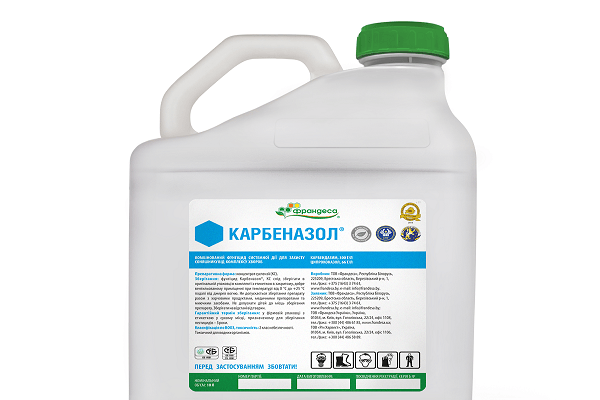
Protective period
The substance remains in the soil for a long time, the active period lasts up to six months from the moment of treatment, therefore Carbendazim is famous for its long-lasting effect and plant protection in the summer cottage throughout the season.
Consumption rates
The consumption rates of the drug depend on the specific treated culture and the infections against which the treatment is being carried out. For the treatment of rye, wheat and barley against root and root rot, as well as for the prevention of crop lodging, the consumption rate will be from three hundred to six hundred milliliters of solution per hectare.
To protect the same crops from powdery mildew, the consumption will be five hundred to six hundred milliliters per hectare. To spray sugar beets from powdery mildew and cercosporosis, six hundred to eight hundred milliliters of solution per hectare of area are required.
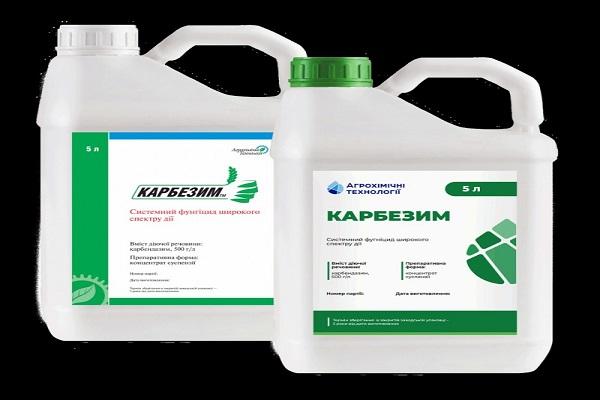
Preparation of working solution
For the solution, only clean water should be used, since foreign bodies and microorganisms contained in unfiltered tap water can worsen the effect of the drug. If using hard water, increase the dosage of the fungicide relative to the amount of water.
The solution itself should be prepared immediately before use and the dosage should be clearly measured, since the prepared solution has a limited shelf life.
First, half of the water is poured into the container, after which the required amount of the drug is added. Then add water to the full volume, thoroughly stirring the solution.

Instructions for the use of the fungicide
The fungicide should be evenly sprayed on the plants with a sprayer. The treatment is carried out during the growing season in order to prevent fungal infections, as well as when the observed signs of damage to the culture appear.
Precautions for use
When working with fungicides, one should not forget about safety. Work clothing must be fully covered. Long sleeves, gloves and hats are required. Protect your eyes with protective goggles. Use respirators for respiratory protection. After treatment, clothes and hands should be thoroughly washed. Exactly follow the instructions for the drug and be careful about the dosages and the required concentration of the solution.
Phytotoxicity
With proper observance of the concentration and consumption rate of the solution, the fungicide does not show phytotoxicity.
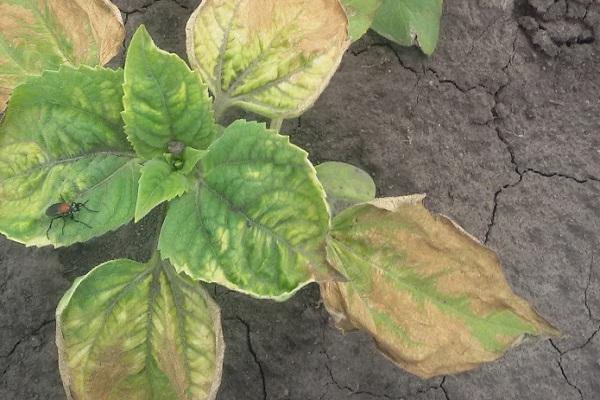
Possibility of emergence of resistance
With frequent use of the drug in populations of harmful microorganisms, resistance to its active components may arise. In order to prevent this, it is recommended to use this remedy with drugs with a different mechanism of action, for example, tebucunazole-based substances are suitable as an alternative. By alternating different drugs with each other, you will achieve maximum efficiency in the fight against cultural diseases.
Is it compatible with other products?
It is compatible with most other fungicides and can be used with most low acid chemicals. Before sharing, drugs should be checked for compatibility.
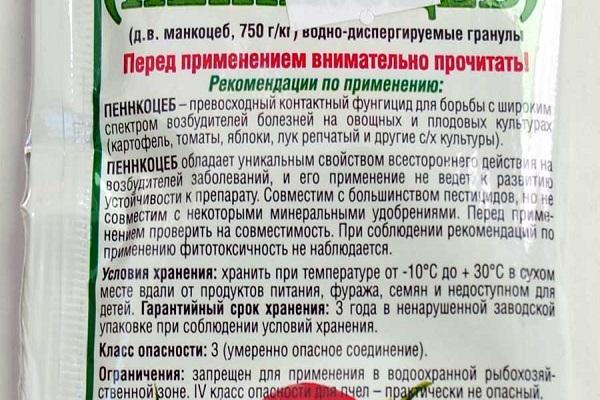
Storage rules
The drug should be stored in its original packaging at temperatures from minus ten degrees Celsius to plus thirty. The shelf life under the storage conditions is two years.
Drug analogues
Other drugs of the class of systemic fungicides can act as analogues. The very essence of the effect of a systemic fungicide is the ability to redistribute the drug throughout the plant, both on its surface and inside.
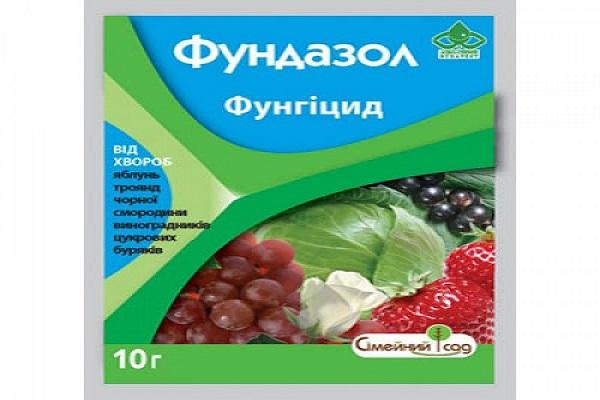
As a replacement for Carbendazim, drugs such as Fundazol, Derozal, Ferozyme are suitable.
Remember that harmful fungal microorganisms can quickly adapt to the effects of systemic fungicides when they are applied to the same crop several times per season. Therefore, for the best effect, they should be alternated with either contact fungicides or systemic fungicides belonging to another chemical group.
